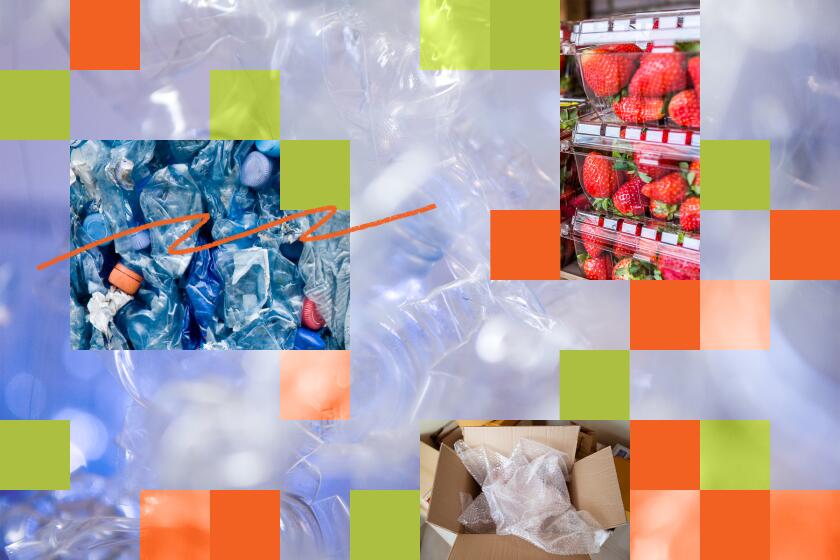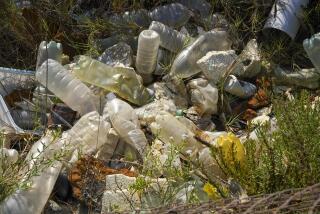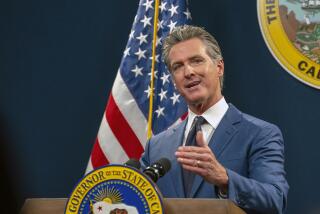
- Share via
On Sunday, Gov. Gavin Newsom signed a bill into law that will close a legal loophole that has allowed for an increase in California’s plastic bag waste, despite a 2014 law that was designed to ban the environmental blight.
“Plastic bags create pollution in our environment and break into microplastics that contaminate our drinking water and threaten our health,” said Jenn Engstrom, state director of CALPIRG, a consumer advocacy group. “Californians voted to ban plastic grocery bags in our state almost a decade ago, but the law clearly needed a redo. With the governor’s signature, California has finally banned plastic bags in grocery checkout lanes once and for all.”
In 2014, the Legislature passed a law that banned single-use plastic bags at grocery store and retail checkout lines. However, they allowed stores to offer consumers, for a small fee, “reusable” bags. Such bags included paper and high-density polyethylene plastic bags, which plastic companies argued could be reused.
This year, CALPIRG released a report showing that the volume of plastic bag waste in California had actually increased since 2014 as a result of the loophole in that law.
Ten years after California passed landmark legislation to reduce plastic bag use, the tonnage of discarded bags has skyrocketed. What happened?
In 2014, 157,385 tons of plastic bag waste was discarded in California. By 2021, that tonnage had skyrocketed to 231,072 — a 47% jump.
Even accounting for an increase in population, the report noted, the number rose from 4.08 tons per 1,000 people in 2014 to 5.89 tons per 1,000 people in 2021.
The new law will go into effect on Jan. 1, 2026 and focuses only on checkout bags — not bags used to hold produce or wrap food that could cause contamination, such as meat. In addition, beginning Jan. 1, 2028, the definition of a recycled paper bag would change from one made from 40% recycled material, to one with more than 50% recycled material.
The new ban “at grocery store checkouts solidifies California as a leader in tackling the global plastic pollution crisis,” said Christy Leavitt, Oceana’s plastics campaign director.
She said plastic bags are “one of the deadliest types of plastic to ocean wildlife,” and noted that when they break down, they become a pernicious environmental pollutant — having been detected in the air, water, plants and human bodies.
“Our state and national elected leaders should continue to adopt new policies to stop plastic pollution at the source,” she said.
A statewide poll released by Oceana in 2022 revealed that 86% of California voters support local and state policies that reduce single-use plastic, and 92% of California voters are concerned about single-use plastic products such as grocery bags, beverage bottles and takeout food containers.
“Nothing we use for just a few minutes should pollute the environment for hundreds of years,” said Laura Deehan, Environment California state director. “Finally, with this necessary update to the bag ban, plastic grocery bags will no longer be a threat to sea turtles, birds and other wildlife in California.”
Gen Z has been heralded as being more invested in environmental issues. But a discussion with ‘green’ youths suggests the plastic habit may be hard to break.
Others hailed the new law as well.
“This is a big deal! Californians voted to ban plastic bags in 2016 and they didn’t get what they voted for,” said Nick Lapis, director of advocacy for Californians Against Waste, referring to Proposition 67, a ballot measure that doubled down on the 2014 plastic bag ban and was approved by California voters. “I think this is an important example of California policymakers being committed to issues over time and not just calling it a day after a bill passes.”
The plastic recycling industry took issue with the bill, however.
“We are disappointed that Governor Newsom has chosen to sign Senate Bill 1053,” said Erin Hass, executive director, of the American Recyclable Plastic Bag Alliance. “This flawed bill is similar to legislation in New Jersey, Canada and other regions that has resulted in the widespread use of imported non-recyclable plastic-cloth bags.”
Also on Sunday, the governor vetoed AB 2214, which would have required state agencies to begin crafting guidance and language to tackle the growing issue of microplastic pollution.
In a statement outlining the reasons for his refusal to sign, Newsom noted a 2018 law that directed the Ocean Protection Council to develop a statewide microplastics strategy, which he described as providing a “comprehensive and coordinated approach to identify early actions California can take to address microplastic pollution and advance existing microplastic research.”
That law required the council and other state agencies to report their findings to the state Legislature by December 2025.
“I believe this bill and the requirement for agencies to build out work plans ahead of the publishing of policy recommendations is premature,” Newsom wrote.









